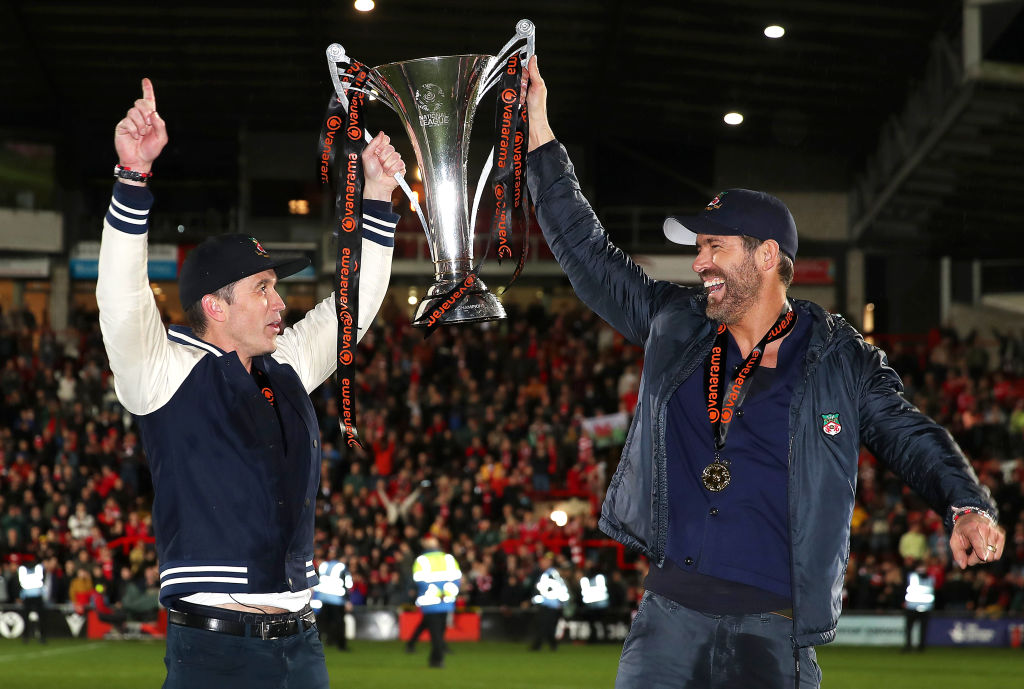Wrexham had never seen anything like it: thousands of fans cheering their team as an open-top bus made its way through the city’s streets. On board, Wrexham’s footballers celebrated their side’s promotion back to the English football league. The club’s star owners, Ryan Reynolds and Rob McElhenney, were there too – and with them, as usual, came the cameras.
The rise of Wrexham has become the subject of a hit Disney+ documentary, Welcome to Wrexham. It’s a feel-good story about Ryan and Rob, two rich and handsome actors from the other side of the Atlantic, taking over a down-and-out club in a depressed industrial heartland and giving it hope.
Wrexham is not the only football club to have let the cameras in. Manchester City, Tottenham, Sunderland and Arsenal have all been the subjects of docu-series in recent years. These programmes satisfy an insatiable appetite for football content. Broadcasters fight for rights to show games, but that is expensive: the current deal for the Premier League, which runs from 2022 until 2025, is worth £4.8 billion. Even the lower rungs of English football command a huge premium for broadcasters: a five-year deal announced this month between Sky Sports and the football league will set the broadcaster back £935 million.
A documentary costs a fraction of that and often makes for good television. But is it good for sport? Much like Made in Chelsea and Keeping Up with the Kardashians, these shows represent a ‘structured’ version of reality in order to maximise their dramatic value. It can be hard to know what is honest and what is scripted – or at least staged for televisual effect.
That’s not to say that what is served up is fake. It’s just that, inevitably, viewers get a sanitised version of what it means to be a footballer. Football clubs are hives of testosterone: the actual cast is made up of overpaid young men with overinflated egos. But on these TV shows, the players and staff are well aware the cameras are rolling – and are usually on their best behaviour. Any less savoury scenes can be edited out.
The outcome is good PR for the football clubs, but viewers are being sold something that isn’t quite true. The highs and lows of a football season are boiled down to a series of narratives to suit the series. The real rows and bust-ups in changing rooms are usually left out.
The journalist Simon Hattenstone has described All or Nothing, an Amazon Prime documentary series that featured his team, as ‘nothing but a gloriously glossy commercial for Manchester City’. Simon Jordan, a former football chairman, says of football reality TV shows: ‘These documentaries… promise the world, deliver very little and increasingly turn the business of football into the business of show.’
It isn’t only football being given the reality TV treatment. Formula 1: Drive to Survive, now in its fifth series, is one of Netflix’s most popular programmes. The company behind that show, Box to Box Films, has also brought out a tennis series, Break Point, and a golf one, Full Swing. Another Box to Box documentary on this year’s rugby union Six Nations championship will be released next year. More niche sports are getting in on the act, too: Make or Break, which follows top surfers, has become a hit on Apple TV+.
The shows follow a similar formula. Sport stars are given character roles for dramatic benefit – hardscrabble heroes, troubled misfits. This appeals to a wider audience: F1 has many more female fans thanks to Drive to Survive, for instance. But for more long-standing supporters, much of the joy comes from trying to decipher the real personality of a sportsman – not just accepting a spoon-fed version of the truth.
Defenders of these shows argue that up-close documentaries bring audiences closer than ever to sport. ‘We’ve given drivers their identities,’ says Ross Brawn, F1’s former managing director. ‘That’s been enhanced by Drive to Survive, which has really focused on the personalities.’ But selective editing leads many viewers to wonder how true to life those ‘personalities’ are. F1 world champion Max Verstappen has said that ‘they try to pick moments and fabricate it in a way’. Another F1 star, Pierre Gasly, has also claimed that some scenes are ‘kind of made up’.
And Brawn’s language – enhancing a sport through the ‘given identities’ – is also telling. Sports chiefs, golfers and other athletes or players all talk about the ‘product’ they offer – or the ‘brand’. They are, in other words, too aware of entertainment value over fair play, of style over substance.
The media happily feeds off this dramatisation for the benefit of consumers. ‘Five storylines we’re excited about ahead of the Miami Grand Prix,’ read an article on the F1 website this month. Storylines, not stories – that’s the new unreality of sport.
Maybe it doesn’t matter if more and more people are entertained. But then sport is just becoming a new kind of televised theatre. The show works as long as you, the viewer, are willing to suspend your disbelief.






Comments